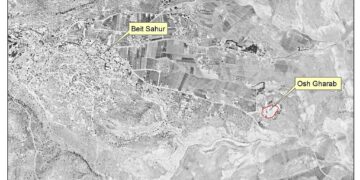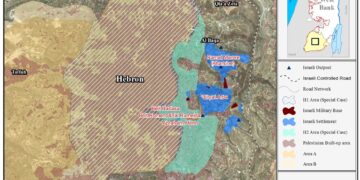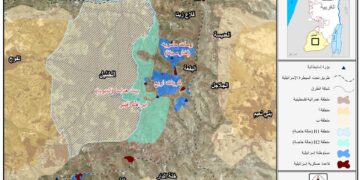Israeli Civil Administration’s Subcommittee for Licensing approved on October 16, 2017 the request for a building permit for 31 housing units in a new settlement in Hebron, on the Shuhada Street. This would be the first plan for colonists in Hebron since 2002, when approximately 10 housing units were built in Tel Rumeida under the excuse of a security need. According to the plan, the construction will take the shape of five floor buildings.

|
Photo 1: The Model of the Planned 31 Units. Source: Peace Now:
The targeted land is relative to Hebron municipality; it used to be a central bus station. During the 1980s, the land was seized for military use through a military order. A military base was established in the area and the central bus station was moved to another location.
In 2007, the Civil Administration’s Legal Advisor issued a legal opinion regarding the residence of six colonist families in the military base , and determined that once the security need ends, the land should return to the hands of the Hebron Municipality, whose protected tenancy status cannot be revoked without a proper cause and a court order.
Two years ago, without any publication, the Civil Administration allocated the land for planning, with the approval of the Minister of Defense. The Ministry of Housing received authorization to plan in the area, and prepared a plan for 31 housing units. This allocation violated the protected tenancy status of the Hebron municipality and the security need for which the land was taken from the municipality turned into a colony need.
Israel's Occupation Authorities brought on September 2016 some 14 caravans and placed them in the area of the bust station, which is located on Al-Shuhada street that is closed since 1994. If implemented, the plan will double the number of colonists in Hebron's Old City by 20%. It is estimated that the number of colonists in Hebron's Old City is around 600 ones.

Regular life in Hebron city before 1994

The kind of life in Hebron after the closure in 1994
Located in the center of Hebron — one of the largest cities in the occupied West Bank — the Old City was divided into Palestinian and Israeli-controlled areas, known as H1 and H2, following the Ibrahimi Mosque massacre. Some 800 notoriously aggressive Israeli colonists now live under the protection of the Israeli military in the Old City, surrounded by more than 30,000 Palestinians. Palestinian residents of the Old City face a large Israeli military presence on a daily basis, with at least 20 checkpoints set up at the entrances of many streets, as well as the entrance of the Ibrahimi Mosque itself.
colonists roam freely in the area of Hebron which is under full Israeli military control, while Palestinians are subjected to severe movement restrictions, including segregated roads, and violence and harassment by soldiers and colonists alike.
It is believed that the colonists of Hebron intend to link Hebron colonies to each other. The six colonies are:
- Gutnech outpost: it is founded in the periphery of the Abraham Mosque
- Abrah Aveno outpost
- Beit Hadasa outpost
- Beit Romano outpost
- Beit Hashisha outpost
- Ramti Shai outpost
Land Research Center sees Israel continuous expansion on colonies in the West Bank and Jerusalem at the expense of Palestinian and lands a flagrant violation of Human Rights and all international laws and conventions, which prohibit disposition of public properties in occupied countries.
UN Security Council resolutions in regard to Israeli colonies:
UN Security Council resolution 446, article 3 " Calls once more upon Israel, as the occupying Power, to abide scrupulously by the 1949 Fourth Geneva Convention, to rescind its previous measures and to desist from taking any action which would result in changing the legal status and geographical nature and materially affecting the demographic composition of the Arab territories occupied since 1967, including Jerusalem, and, in particular, not to transfer parts of its own civilian population into the occupied Arab territories;"
- Un Security Council resolution 452, article 3"Calls upon the Government and people of Israel to cease, on an urgent basis, the establishment, construction and planning of settlements in the Arab territories occupied since 1967, including Jerusalem;"
- Un Security Council resolution 465, Strongly deplores the continuation and persistence of Israel in pursuing those policies and practices and calls upon the Government and people of Israel to rescind those measures, to dismantle the existing settlements and in particular to cease, on an urgent basis, the establishment, construction and planning of settlements in the Arab territories occupied since 1967, including Jerusalem;
Calls upon all States not to provide Israel with any assistance to be used specifically in connexion with settlements in the occupied territories;
-
Un Security Council resolution 242, Affirms that the fulfilment of Charter principles requires the establishment of a just and lasting peace in the Middle East which should include the application of both the following principles:
(i) Withdrawal of Israel armed forces from
territories occupied in the recent conflict;
(ii) Termination of all claims or states of belligerency and respect for and acknowledgment of the sovereignty, territorial integrity and political independence of every State in the area and their right to live in peace within secure and recognized boundaries free from threats or acts of force;
Convention (IV) respecting the Laws and Customs of War on Land and its annex: Regulations concerning the Laws and Customs of War on Land. The Hague, 18 October 1907.
Article 46. Private property cannot be confiscated.
Article 55: The occupying State shall be regarded only as administrator and usufructuary of public buildings, real estate, forests, and agricultural estates belonging to the hostile State, and situated in the occupied country. It must safeguard the capital of these properties, and administer them in accordance with the rules of usufruct.
- Art. 49. Individual or mass forcible transfers, as well as deportations of protected persons from occupied territory to the territory of the Occupying Power or to that of any other country, occupied or not, are prohibited, regardless of their motive.
- Art. 53. Any destruction by the Occupying Power of real or personal property belonging individually or collectively to private persons, or to the State, or to other public authorities, or to social or cooperative organizations, is prohibited, except where such destruction is rendered absolutely necessary by military operations.
-
Art. 147. Grave breaches to which the preceding Article relates shall be those involving any of the following acts, if committed against persons or
property protected by the present Convention: wilful killing, torture or inhuman treatment, including biological experiments, wilfully causing great suffering or serious injury to body or health, unlawful deportation or transfer or unlawful confinement of a protected person, compelling a protected person to serve in the forces of a hostile Power, or wilfully depriving a protected person of the rights of fair and regular trial prescribed in the present Convention, taking of hostages and extensive destruction and appropriation of property, not justified by military necessity and carried out unlawfully and wantonly.
Prepared by
The Land Research Center
LRC












